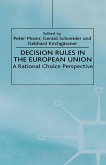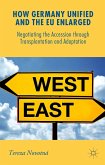Investigating public scepticism in Eastern Europe towards the EU, this book examines how citizens' and parties' responses to integration have been affected by economic, social, institutional and historical circumstances. Focusing on the importance of normative and instrumental bases of support and opposition for integration provides great insight.
Hinweis: Dieser Artikel kann nur an eine deutsche Lieferadresse ausgeliefert werden.
Hinweis: Dieser Artikel kann nur an eine deutsche Lieferadresse ausgeliefert werden.
"European integration used to be crafted by a small elite, but today it is increasingly a function of party politics and broad public pressure. This is particularly so in countries that have recently built democracy on the ashes of communism and decided to join the European Union. Using extensive data from the region the book examines the complex politics of EU accession and shows how Eastern European citizens and parties respond to the process of European integration. Rohrschneider and Whitefield assembled a group of outstanding analysts from both parts of Europe and the United States. The book gives ample space to both theoretical and empirical considerations. The analysis of various strands of Euroscepticism is particularly revealing. The book will be essential reading for scholars and students of Eastern Europe and the process of European integration." - Jan Zielonka, Oxford University








